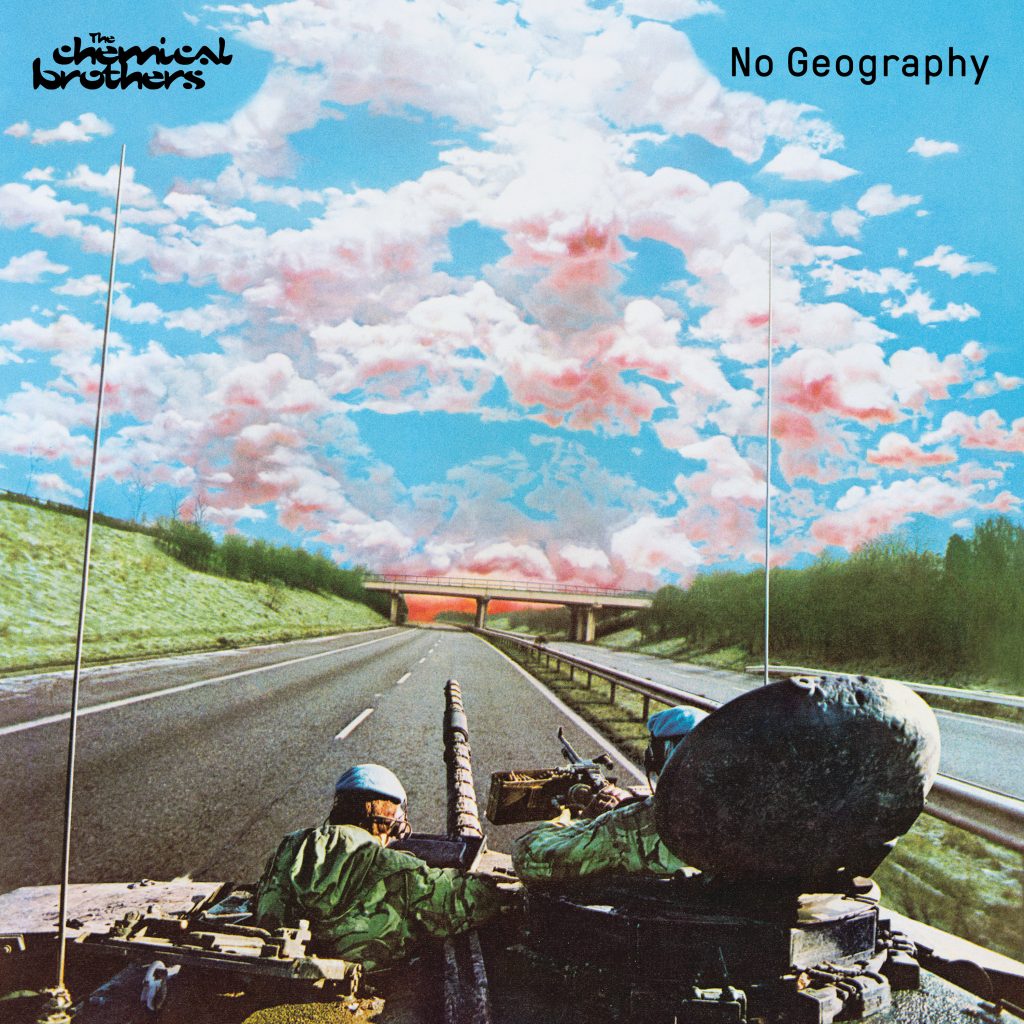Who knew that The Chemical Brothers were skilled navigators of time travel? Tom Rowlands and Ed Simons have regenerated themselves sonically for No Geography, album nine, by revisiting their early days – but not getting stuck there. No Geography – led by last year’s acid-tech banger ‘Free Yourself’ – isn’t dad rave. Indeed, the UK duo flip retro futurism through timelessness. As such, No Geography isn’t a reinvention but a reformulation.
Post-EDM, ’90s electronica megastars like Underworld are more germane to popdom than ever – and certainly aren’t perceived as heritage acts. In November, The Prodigy returned triumphantly with No Tourists, topping the UK charts – Keith Flint’s recent passing acutely poignant. The Chemical Brothers came back convincingly in 2015 with the pop-aspiring Born In The Echoes. They demonstrated their clout recruiting as guests Beck, St Vincent and Q-Tip (who reprised ‘Galvanize’ with ‘Go’). Ironically, The Chemicals and their peers have outlasted 2000s nu-rave bands like Klaxons. But perhaps the very notion of nostalgia is in flux in dance music.
In contrast to The Prodigy, The Chemical Brothers were always geeks – meeting as history students in Manchester. Originally named The Dust Brothers, the DJ/producers precipitated the ’90’s big beat scene, together with Fatboy Slim. The Chemical Brothers debuted in 1995 with Exit Planet Dust. However, they gradually defined their style as psychedelic, and then, showed their predisposition towards film music with 2010’s Further.
After Further, Simons took time out from touring to engage in a mysterious academic pursuit – and it briefly looked as if The Chemical Brothers would become a one-man act, akin to Leftfield. Now, apparently, he’s back.
The Grammy winners have produced signature singles in their time, such as 1997’s ‘Block Rockin’ Beats’. But No Geography, which clocks in at just over a punchy 45 minutes, feels like the two intended it to be an album experience, not a launchpad for hits.
The Chemical Brothers approached No Geography very differently to Born In The Echoes. For one, they utilised vintage studio equipment uncovered in Rowlands’ attic. Inevitably, No Geography is a throwback to Exit Planet Dust. It’s also simpler. The Chemicals have long worked with illustrious vocalists – Beth Orton a frequent collaborator. A secret Detroit techno buff, Noel Gallagher hopped on ‘Setting Sun’ at the height of Oasis’ Brit-pop fame. The Chemicals even enticed Mazzy Star’s elusive Hope Sandoval to cameo on 1999’s Surrender. Nonetheless, No Geography‘s main feature artist is the whimsical Norwegian electro-popster AURORA (shortly touring Australia with Groovin The Moo) on multiple songs. At 22, AURORA was born almost exactly on the first anniversary of Exit Planet Dust.
Curiously for a rising star, AURORA hasn’t thrown herself into collabs – only notably blessing Danish techno DJ Kolsch’s ‘In Bottles’. But she charges forth on No Geography‘s doomsday opener, ‘Eve Of Destruction’, alongside Japanese rapper Nene (of Yurufuwa Gang). The song, prefaced by robo chants, combines the synths of Detroit’s Inner City with an upfront disco bassline and bells, before colliding into ‘Bango’ – a percussive breaks colossus, which AURORA again sings. The Scandinavian is unrecognisable on ‘The Universe Sent Me’, a six-minute psy-rock excursion, transforming into the zany New Wave icon Lene Lovich. AURORA intones, “I cave in.”
Elsewhere, No Geography finds The Chemical Brothers manipulating vocal samples – from old soul, disco and spoken word recordings (they’ve discovered John Giorno’s ’60s Dial-A-Poem enterprise). The sanguine ‘Got To Keep On’ is disco plunderphonics, comparable to The Avalanches’ ‘Subway’. Here, The Chemicals stray into house, as they did on Surrender. The track actually has live crowd atmospherics. Yet, more than house, The Chemicals are revelling in acid – cue the warehouse party singles ‘Free Yourself’, ‘MAH’ (‘Mad As Hell’) and ‘We’ve Got To Try’.
No Geography‘s apex is the title-track, which, while repurposing the words of American beat poet Michael Brownstein, sounds weirdly like Simple Minds covering Tinashe’s exhilarating ‘Feels Like Vegas’ under Jon Hopkins’ guidance. Still, the album’s finale, ‘Catch Me I’m Falling’, is the most experimental: try Balearic emo balladry.
Somehow, The Chemical Brothers have delivered a cerebral dance record without being conceptual or even pretentious. No Geography surely has a political angle, but it’s indirect – much less didactic. In spirit, No Geography is transcendental rather than transgressive. The Chemicals aren’t self-consciously ‘innovating’. If they’ve scoped out James Blake, it isn’t obvious. But The Chemical Brothers have never indulged in cynical opportunism to remain trendy. They keep moving, steadily resisting stasis. In fact, The Chemicals might have finally realised what can accurately be tagged ‘progressive house’.
–












